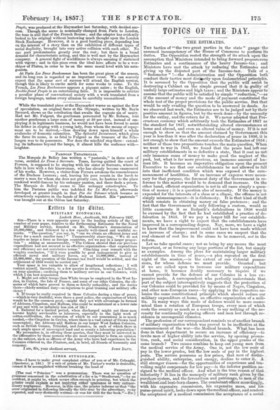tttirrs to t4e
II,ITAHE ECONOMIES.
Lesketh How,Ambleside, 9th February 1857. SIR—There is a very apposite query in the leading article of the last number of your paper, relative to the forthcoming Estimates for the Naval and Military service, founded on Mr. Gladstone's denunciation of 25,000,0001., and followed by a few equally well-timed and truthful remarks. "The question," you say, is "can we obtain an efficient Army and Navy for a much smaller sum ? " Unanswerably observing, "We do not require so large a force as foreign countries, yet we pay in a larger proportion " ; adding as unanswerably, "The Crimea showed that our previous expenditure had not secured to us effective organization—that expenditure and efficiency are not correlative terms." Clinching your remark with the weighty conclusion, "If it were possible by good management to give us efficient naval and military forces, say at 15,000,000/., instead of 26,000,0001., the question of the Income-tax itself would be settled, and the settlement of 1853 would be carried out."
Your space is too valuable to allow of lengthened reflections ; I will restrict myself, therefore, to a few queries in return, bearing, as I believe, on your question ; confining them to military service in our Colonies, with which I am best acquainted. 1. Might not other troops than White troops be employed in the West Indies, in Ceylon, the Isle of France, and some of our other Colonies, the climates of which have proved to them so fatally unhealthy, and the duties there—chiefly sentinel duty—so injurious to good training and military efficiency?
2. If troops be really required in those Colonies during a time of peace, —which is very doubtful, were there a good police, the organization of which would be for the common good,—might they not with advantage be formed of Africans, Cingalese, and Maltese, who could be maintained at a lower rate of pay and with an infinitely less risk of life ? 3. Enlisted for a limited period, when discharged might not these men become highly serviceable as labourers, especially in the light work of cotton-cultivation the extension of which in our possessions is so much needed,—the Cingalese in Ceylon, where there is a vast extent of Crown land unoccupied ; the Africans and Maltese in our larger West Indian Colonies, such as British Guiana, Trinidad, and Jamaica, in each of which there is such ample space of unoccupied land and so scanty a labouring population? My persuasion is, in oftbring these queries, that they must be answered in the affirmative by those persons who are most competent to form an opinion on the subject, such as officers of the Army who have had experience in the Colonies referred to, the Planters, and, in brief, all friends of humanity and economy.
I am, Sir, your obedient servant, JOHN DA.VT.


























 Previous page
Previous page